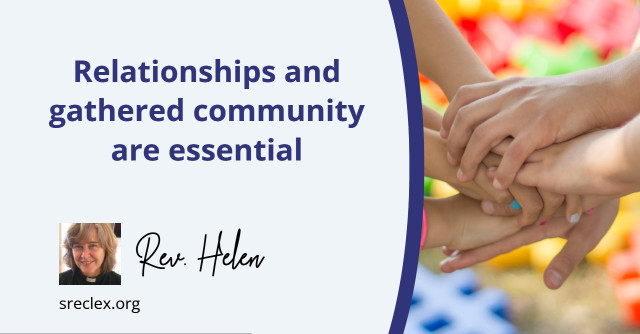
Relationships and Gathered Community are Essential
Summer is a good time to kick back a bit, visit family and friends, take some time out. I may be attending General Convention in Baltimore and the Lambeth Conference in the UK this summer, but I know I shall be thinking about you all, holding you all in prayer, and thinking about the next church year. Summer is part of our long season of Pentecost (it goes all the way through to Christ the King at the end of November) – the season of learning about, as I said a few weeks ago, the work of following Jesus, being disciples, being church. Although everyone is tired of talking about the effects of Covid on our work, churches, ministries etc, it will be a theme in the meetings I attend. And that’s good, because whether we are honest about it or not, the pandemic years have changed us and our churches. Perhaps the most common comment I heard during Covid is ‘I miss my church’, but have we given thought to what ‘miss’ means, and what it means to be church post-Covid pandemic.
In chatting about this with a variety of people, including Christina Embree, our speaker at Dinner Church on August 27, there is some agreement that Covid made apparent that our relationships and gathered community are essential to our spiritual walk and faith formation. Christina shared an article she wrote early in the pandemic: ‘Christians were made for living in the community of the church and it is in that gathered community that we flourish and become most fully Christian for Christ is in the midst of those gathered in His name’ (Matthew 18:20).
Community-building needs work because barriers to community are swift to arise, and betray developing and maintaining community that sustains us physically and spiritually. The ‘generational gap’, as they say, is ‘the perceived difference of opinions between one generation and another regarding beliefs, politics, or values.’ In a rapidly changing world, everything from architecture to technology is marked by age-specific lines, and isolation, loneliness and socialization are affected by those lines. Churches have rooms for specific ages; style of services to appeal to different ages; and age-specific curriculum and Bible studies. Our faith is dependent on generational discipleship; passing the faith from one generation to another. As Psalm 145 says, “One generation commends God’s works to another”, but all generations are not equally represented within the church. As Christina Embree has shown me, ‘intergenerational ministry’ is an interesting opportunity to bridge the generational gap and re-establish a more connected faith community.
Intergenerational ministry is not children’s ministry or family ministry within the church: it is ministry with the broadness of the whole church, all generations, in a communal and corporate context, for worship, ministry and mission connecting across generational boundaries for discipleship, faith formation, and community building. We’ve all heard these names: the Silent Generation (born 1924-1942), Baby Boomers (1943-1964), Generation X (1965-1980), Millennials (1981-2000), and Gen Z (2001-current). For the church, the older generations bring a wealth of faithful testimonies, historical worship practices, and community-sustaining disciplines – they need to be needed and offer legacy-leaving possibilities. The middle generations bridge new experience with their techie and media knowledge – and they seek relationships, mentorship, discipleship. The youngest generation offer current application of spiritual truths in a dynamic cultural environment – and want a role and identity in church, not just a safe place for kids.
Christina has some suggestions for cultivating ‘intergenerational ministry’, like the Pray For Me Campaign that links each child and youth in the church with prayer companions from older generations in an intercessory relationship. Prayer partners promise to pray for them for an academic year and they, in turn, pray for their prayer partners, leading to closer relationships between the prayer partners and child/youth, across the church, and between families.
What else might we do at St Raphael’s that would bring the strengths and needs of each generation together for the good of our congregation and community? Bring your thoughts to Dinner Church on August 27.
